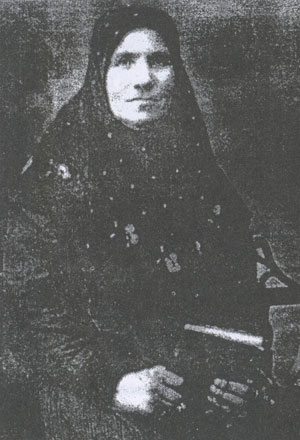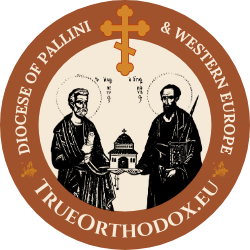HOLY NEW CONFESSOR ELDRESS XENIA OF RYBINSK

by Dr. Vladimir Moss
Blessed Xenia was born in 1848 into a peasant family in the village of Larionovskaya, Myshkin uyezd, Yaroslavl province. From a young age, she displayed great piety and the gift of prophecy. Fleeing marriage, at the age of nineteen she fled into the woods, where she lived as a hermitess, living on plants and berries. St. John of Kronstadt and his assistant Fr. Michael Zelinsky communed her twice and blessed her exploit. After thirty years, she returned to her native village of Rudinsky Slobodka, Myshkin uyezd. She was almost blind. She prophesied the coming of Soviet power and called it the Antichrist. So she was hated by the Bolsheviks in Yaroslavl province. But evidently, her fame and the love of the people prevented them from killing her. Many hierarchs and confessors of the Catacomb Church venerated her and sought her advice, including Joseph of Petrograd, Agathangel of Yaroslavl, Cyril of Kazan, Mark of Sergievo, and Seraphim of Uglich. She firmly rejected the declaration of Metropolitan Sergius and belonged to the Catacomb Church. Once Metropolitan Agathangel was tempted to accept the declaration, and asked Blessed Xenia for advice. She replied: “If you agree, you will lose everything you acquired earlier.” One of the most zealous leaders of the Catacomb Church was Archbishop Seraphim of Uglich. Blessed Xenia called him “the best archpastor after the reposed Patriarch Tikhon”. After Sergius’ declaration, many priests went to the Eldress for advice. There were even some who tried to justify Metropolitan Sergius, saying he was not a heretic. Michael Novoselov, the future hieromartyr, recounts the Eldress’ reply: “What do you mean, not a heretic? He is worse than a heretic, he has bowed down to the Antichrist, and if he does not repent, his lot will be in gehenna with the Satanists.” “The Eldress had earlier foretold her own arrest (and release) and calmly waited for it. They arrested her in 1930. She was well beyond 70 years of age, but this did not embarrass the chekists: at the interrogations, they mocked and despised her, and used tortures. But she bore it all with patience, and always spoke openly and without fear. She was exiled to Arkhangelsk, but after two years returned, as she had foretold. After her exile, the Eldress lived without registration, in secret. At first, she went around the neighbouring villages. Then she spent some time in Bezhetsk in Tver province. Then she stayed in Rybinsk, in the house of an academic and a deeply believing man, Alexis Alexeyevish Ukhtomsky. In April 1934 the Eldress with her cell-attendant were again arrested, evidently in connection with the affair of Archbishop Seraphim (Samoilovich). At this time, in March and April, the remaining co-strugglers with Archbishop Seraphim were being arrested. They were all spiritual children of the Eldress Xenia. The reason for the arrests was the “Act of the Exiled Bishops” composed by Archbishop Seraphim in his Archangelsk exile and signed by many authoritative bishop-confessors. At the interrogations the 80-year-old Eldress was again tortured and threatened; they promised to starve her in prison. She attracted general attention in the camp, the more so in that they had all heard that she was clairvoyant. Seeing the general interest in this “anti-Soviet element”, the camp commandant, a Bolshevik and an atheist, decided to mock the saint in front of everyone and to prove that her clairvoyance was a lie. He ordered a crow to be shot and made into soup for the Eldress out of its flesh, so as to mock and unmask her supposedly false knowledge of today and tomorrow. When they brought this food to the Eldress in her cell, she smiled sadly: “O mother crow, you have flown all over the place, but have landed up in Aksinia’s soup!” And she said to the guards: “Eat it yourselves, I will live on the Holy Spirit…” The amazed commandant, seeing such convincing confirmation of clairvoyance, took no pity at all on the innocent Eldress and pronounced his sympathy over her great misfortune – to suffer in prison at such an advanced age. But the Eldress calmly replied: “But the misfortune is yours, not mine. Go home quickly!” The commandant hurried home, trembling in anticipation, and there he found waiting for him a sad telegram announcing that his wife had just died. Shaken by what had happened, and receiving the most infallible proofs of the Eldress’ clairvoyance, he set about interceding that she be released. He referred to the fact that it was senseless to detain such an old and sick person, who was also a burden for the guards. And by the will of God, the Eldress returned to her homeland. She prayed almost without ceasing, sitting on a chair, serious and severe, all in black, reading prayers with a prayer-rope. Nina Alexeyevna remembered with feeling how the Mother of God appeared to the Eldress. “It was in the evening, practically night. Only we, the children, were at home. The old woman was praying quietly, and we began to nod off under her whispering. But I woke up from a clear, all-illumining light in the old woman’s house. Being only half awake, we could not understand anything. Then we ran to her and asked her: what had happened? But she was so moved, so happy, and she talked to us very quietly: “The Mother of God came! She had only to appear, I was enveloped in happiness! Glory to Thee, O Lord, for counting me worthy of such ineffable joy!” The Eldress was under the constant surveillance of chekists and policemen. The police spied on her constantly and drove away the visitors who were dear to her. So as to avoid this, a pit was dug under the stove of the Eldress’ cell. There she could hide if the police unexpectedly arrived. Once the nun Paranya (Paraskeva Ivanovna), the Eldress’ helper, ran up. “O dear! The police are coming! Perhaps it’s not the village police this time, and they’re not very merciful!” An elderly policeman came up to the Eldress and asked her crudely: “Do you figure out everything?” The Eldress said sharply: “I see you completely, and I know all about you.” “What, for example?” ”Well, you’ve abandoned your wife and gone off with a bad woman!” The policeman hemmed: “You’re right… But you could have heard that. So… what’s going to happen to me in the future?” “Don’t worry about that, you have no future.” “What do you mean, ‘no future’? I’m going to die, is that it?” “In the first days of the war with Germany you will be killed.” “You’re not talking sense, old woman! We’ve just signed a peace agreement with the Germans, An important state treaty.” The Eldress replied sadly: “The Germans will spit on that treaty. They’ll really lay in to the people… And you will be among the first…” The policeman was silent. He sat on a bench. He began to talk a lot with the old woman. But she added nothing new (well, nothing about the future – what was the point of talking with such a person?) And the policeman said goodbye and went off to the remainder of his short life. Not only did the Eldress foretell the coming war with the Germans beforehand, but also the war with Japan at Hasan and Khalkin-Gola, and the blockade of Leningrad, which is why she forbade her spiritual children to go and live there. The Eldress’ divine gift revealed itself in other ways. “Thus she once said to the little boy of the family of Nicholas Artamanovich: ‘Go off, dear one, and get me some water from the spring. Bring me the water, and I will wash myself in it, it will help my eyes a little!” The child was very surprised – there was no water nearby! But he obeyed, and went to the ravine that the Eldress had indicated, and – wonder of wonders – saw that a small crystal-clear spring had appeared! And from then on every day the child went to it for water for the Eldress. By 1940 almost all the Eldress’ spiritual children had received martyric crowns. One of the last of her venerators who were hiding from arrest at that time, was the confessor Protopriest Sergius Mechev, the son of the holy Righteous Alexis Mechev of Moscow. He hurried to the Eldress, who was at that time of universal betrayal and apostasy the last spiritual authority. Fr. Sergius managed to meet her in 1940, not long before her righteous death. The blessed one met him and said: “Hieromartyr!” Two years later Fr. Sergius was arrested and received a martyred death through shooting. In the last days of the Eldress’ earthly life there was no improvement. Atheism gathered strength, faithful pastors were killed in droves. The Eldress saw in this the fulfilment of the prophecies of the last times and warned of an even worse future: “After us there will be no more elders.” But the Eldress foresaw a small regeneration of Orthodoxy before the very end. She even affirmed that Russia “will be ruled by a tsar of a princely race”. The Eldress Xenia knew about her death beforehand. She prayed for a long time, then asked that she be washed and dressed in clean clothes. She wanted to depart into the other world alone, and at the last moment asked her cell-attendant to go out to the well to bring some fresh water. She hurried to carry out her request, but when she returned the soul of the Eldress had been released from this world. The Eldress died on August 1/14, 1940, the feast of the Maccabean martyrs. At her burial there was a large number of people, which was unusual at that terrible time. And they remembered the last conversation of the blessed one, how she had told her close ones that she would soon depart to the Lord. And when they sadly asked: who then would teach them and comfort them in difficult times, she calmly and firmly replied that they should go to her grave and ask her in prayer: “I will help you as far as I am able. Only come with prayer! With true faith in the Lord God! Remember that!” The people did not forget the Eldress Xenia. A beautiful iron cross was placed on her grave. And on the monument were engraved the words: “Thy will be done, O Lord!”






